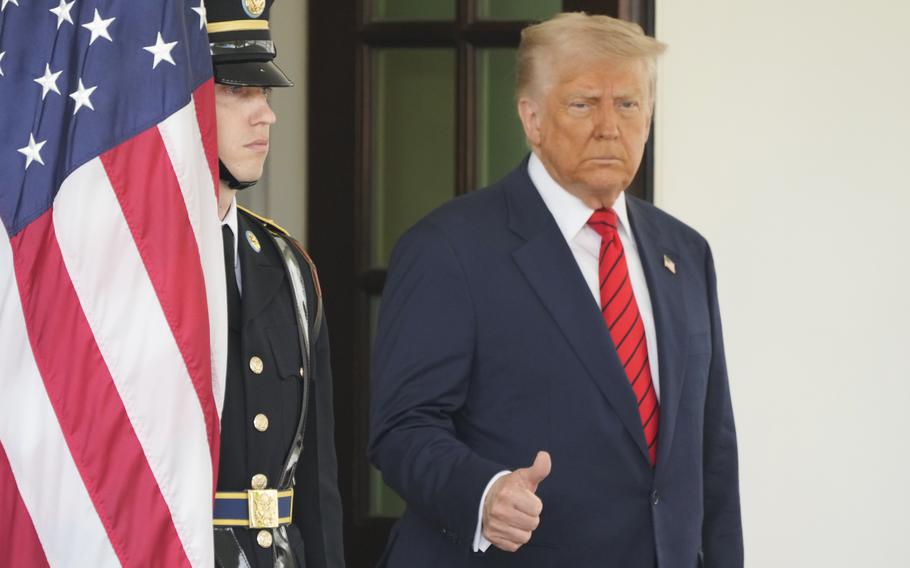
President Donald Trump waiting to greet Canadian Prime Minister Mark Carney at the West Wing of the White House, Tuesday, May 6, 2025, in Washington. (Mark Schiefelbein/AP)
WASHINGTON — President Donald Trump said Tuesday that he’s ordering a halt to nearly two months of U.S. airstrikes on Yemen’s Houthis, saying that the Iran-backed rebels have indicated that “they don’t want to fight anymore” and have pledged to stop attacking ships along a vital maritime corridor.
“We’re going to stop the bombing of the Houthis, effective immediately,” Trump said at the start of his Oval Office meeting with Canadian Prime Minister Mark Carney.
Trump said that the Houthis had indicated to U.S. officials that “they don’t want to fight anymore. They just don’t want to fight. And we will honor that, and we will stop the bombings.”
That likely means an abrupt end to a bombing campaign that began in March, when Trump promised to use “overwhelming lethal force” after the Houthis said they would resume attacks on Israeli vessels sailing off Yemen in response to Israel’s mounting another blockade on the Gaza Strip.
At the time, they described the warning as affecting the Red Sea, the Gulf of Aden, the Bab el-Mandeb Strait and the Arabian Sea.
Trump said the Houthis had “capitulated but, more importantly, we will take their word that they say they will not be blowing up ships anymore. And that’s what the purpose of what we were doing,” Trump said.
“I think that’s very positive,” Trump added. “They were knocking out a lot of ships.”
Asked how the Houthis had communicated that they were looking to stop being targeted by U.S. bombs, Trump offered few details, saying only with a chuckle that the information came from a “very good source.”
A short time later, Omani Foreign Minister Badr al-Busaidi, confirmed that the U.S. bombing campaign was ending, posting on X that discussions involving the U.S. and Oman, as well as negotiators in Yemen, “have resulted in a ceasefire agreement between the two sides.”
“In the future, neither side will target the other, including American vessels, in the Red Sea and Bab al-Mandab Strait, ensuring freedom of navigation and the smooth flow of international commercial shipping,” he wrote, calling the agreement a “welcome outcome.”
Defense Secretary Pete Hegseth said on social media that Trump’s “objective from Day One: ‘ensuring freedom of navigation.’ PEACE THRU STRENGTH in action.”
The broad-based missile strikes Trump had ordered were similar to ones carried out against the Houthis multiple times by the administration of his predecessor, Democratic President Joe Biden, in response to frequent attacks against commercial and military vessels in the region.
The Trump-ordered airstrikes gained a higher profile in the public consciousness when The Atlantic revealed that Hegseth had texted sensitive plans for a military strike against the Houthis on a group chat in the messaging app Signal that mistakenly included the magazine’s editor-in-chief.
Trump stood by Hegseth and downplayed the breach as a “glitch.” But national security adviser Mike Waltz, who created the group chat on Signal, left his post last week and has been nominated by Trump to be the U.S. ambassador to the United Nations.